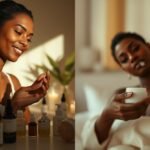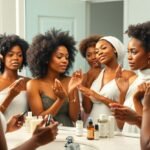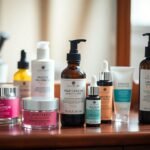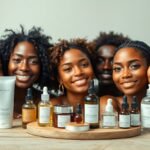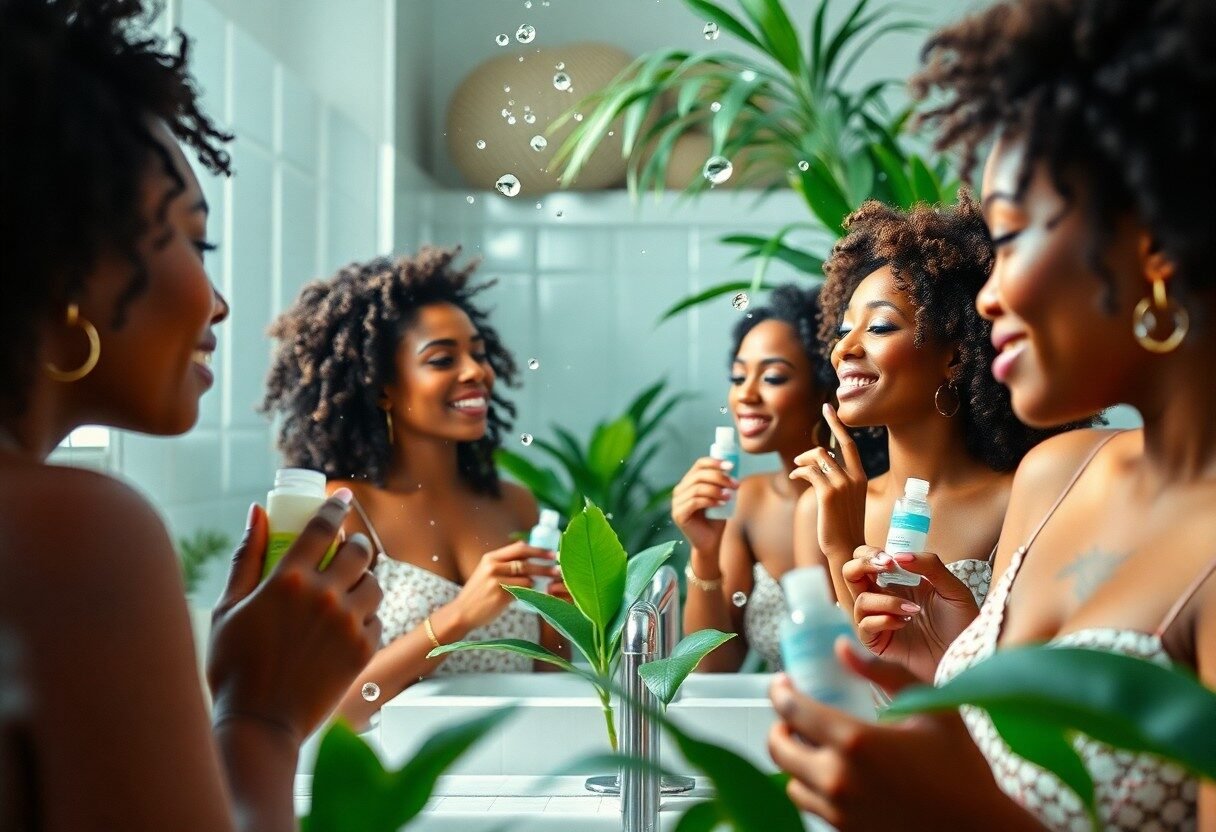
Hydration is imperative for maintaining healthy, radiant skin, especially for African American women who may struggle with unique skin concerns. I want to emphasize that dehydrated skin can lead to a host of issues, including dryness, flakiness, and increased susceptibility to aging. By ensuring your skin remains well-hydrated, you can achieve a more <strong=glowing=”true”>youthful and vibrant complexion. In this blog post, I’ll share effective tips and insights on how to keep your skin hydrated, which is key to enhancing your overall skincare routine.
Key Takeaways:
- Hydration plays a significant role in maintaining the skin’s barrier function, which is imperative for African American women to combat dryness and maintain a healthy appearance.
- Moisturizers should contain hydrating ingredients like hyaluronic acid, glycerin, and natural oils to effectively nourish and protect the skin.
- Adequate hydration can help mitigate common skin issues, such as hyperpigmentation and uneven skin tone, which are prevalent in African American skin types.
- Drinking enough water supports overall skin health, as internal hydration contributes to a more radiant complexion.
- Climate and environmental factors can influence hydration levels, so adjusting skincare routines with seasonal changes is advisable.
- Incorporating hydrating serums or essences into daily skincare regimens can enhance moisture retention and boost skin elasticity.
- Personalizing hydration strategies to suit individual skin types, such as oily or dry, ensures optimal results in skincare routines.
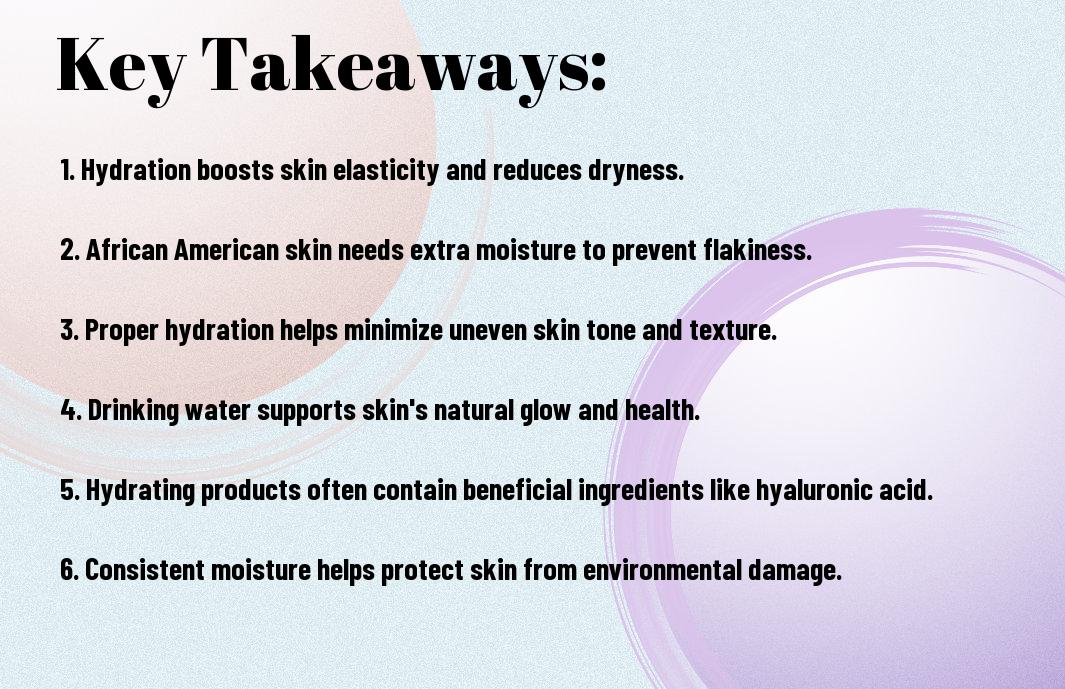
The Unique Skincare Needs of African American Women
Skin Structure and Composition Differences
Understanding the distinct skin structure and composition differences in African American women is fundamental to effective skincare. Melanin-rich skin typically possesses a thicker epidermis and greater barrier function. This unique composition offers enhanced protection against sun damage but can also lead to a higher likelihood of post-inflammatory hyperpigmentation when injuries or acne occur. The oil glands in darker skin often produce more sebum, creating a different set of needs when it comes to moisture and hydration. Tailoring my approach to these specific characteristics is imperative for optimal skin health.
Common Skin Concerns and Conditions
African American women often face unique challenges like hyperpigmentation, keloids, and dullness. These issues stem from factors such as skin type, historically fewer skincare options tailored for our needs, and the impacts of environmental stressors. Due to the higher levels of melanin, hyperpigmentation can be more pronounced and difficult to treat. It is imperative to deal with these conditions early on to prevent long-lasting effects, which requires selecting products specifically designed for my skin type.
Hyperpigmentation occurs when the skin produces excess melanin, often as a response to skin trauma or inflammation. Keloid scars can form from cuts or acne, and their incidence is more common in women with darker skin. To combat these concerns, incorporating targeted treatments like vitamin C serums for brightening and exfoliants that promote cell turnover is imperative. Additionally, ensuring that I use moisturizers that contain hyaluronic acid can maintain hydration while addressing dryness, ultimately leading to a more radiant complexion.
The Science of Skin Hydration
Understanding the Skin’s Barrier Function
The skin’s barrier, primarily made up of the stratum corneum, plays a vital role in protecting against environmental aggressors and preventing water loss. This outer layer, composed of dead skin cells and lipids, acts as a shield that maintains hydration levels within the skin. For African American women, ensuring that this barrier is intact and functioning optimally is crucial, as it often battles unique challenges such as dryness and hyperpigmentation.
The Role of Water in Skin Health
Water is fundamental to maintaining skin health, as it hydrates cells, supports the skin’s elasticity, and aids in cellular repair. Adequate hydration promotes a luminous, healthy complexion, making it easier for your skin to combat issues such as inflammation and irritation. Additionally, replenishing water levels in your body can reduce the appearance of fine lines and enhance overall skin texture, particularly for African American women who may experience drier skin types.
Drinking enough water daily – aiming for at least eight 8-ounce glasses – can significantly enhance your skin’s natural barrier function. Cellular hydration ensures that the skin retains its plumpness and resilience, which is often compromised by environmental factors like pollution or harsh weather conditions. Incorporating water-rich foods such as cucumbers, oranges, and strawberries into your diet can likewise support hydration from the inside out, creating a more vibrant and youthful appearance.
Cultural Influences on Hydration Practices
Traditional Remedies and Their Impacts
In many African American communities, traditional remedies have played a significant role in skincare, especially relating to hydration. Ingredients such as shea butter, cocoa butter, and aloe vera are deeply rooted in cultural practices. These natural emollients are often used not just for their moisturizing properties, but also for their rich history in nurturing skin. Families often pass down these remedies, highlighting the strong connection between cultural identity and personal skincare regimens.
Modern Influences and Trends
Current trends in the beauty industry reflect a blend of extensive research and a return to natural products. The rise of clean beauty has prompted a shift towards products free from harmful chemicals, aligning with traditional practices. Ingredients like hyaluronic acid and vitamin E are now being infused with cultural staples like jojoba oil and black seed oil to enhance hydration specifically for African American skin. Additionally, social media platforms serve as a vital space for sharing these modernized beauty practices, fostering a community of empowerment and authenticity.
While traditional remedies provide a foundation for hydration practices, modern innovations are adapting to meet evolving needs. Brands are increasingly recognizing the unique hydration challenges faced by African American women, addressing issues like dry skin and uneven texture. For instance, products that blend botanical oils with science-backed ingredients are becoming popular choices. Integrating these modern trends with cherished traditions not only helps in efficacy but also invigorates a sense of cultural pride and individuality in skincare routines. Adapting your hydration methods to include both can create a harmonious balance, ensuring your skin stays nourished and vibrant.
Hydration’s Role in Preventing Skin Issues
Addressing Dryness and Flakiness
Dryness and flakiness are common issues many African American women face due to naturally lower oil production in darker skin tones. Inadequate hydration can result in the skin appearing dull and lifeless. Regular application of moisturizers that lock in hydration, particularly those rich in ingredients like hyaluronic acid and glycerin, can significantly alleviate these symptoms. I’ve found that incorporating a hydrating serum along with my moisturizer has made a noticeable difference in the texture of my skin.
Combating Hyperpigmentation and Eczema
Hyperpigmentation and eczema are prevalent conditions that can be exacerbated by insufficient hydration. Over time, I’ve learned that dehydrated skin often leads to increased melanin production, resulting in darker spots. Similarly, eczema, characterized by inflammation and irritated patches, thrives in an environment devoid of moisture. Keeping your skin hydrated serves not only as a preventative measure but also aids in healing existing skin issues.
Focusing on hydration helps manage both hyperpigmentation and eczema effectively. For hyperpigmentation, I’ve discovered that products containing Vitamin C and niacinamide can brighten and even out skin tone when used in conjunction with a robust hydration routine. On the other hand, eczema often responds well to occlusive agents such as shea butter and petroleum jelly, which seal in moisture and provide a much-needed barrier. By prioritizing hydration, I’ve noticed a significant improvement in my skin’s health and resilience against these issues.
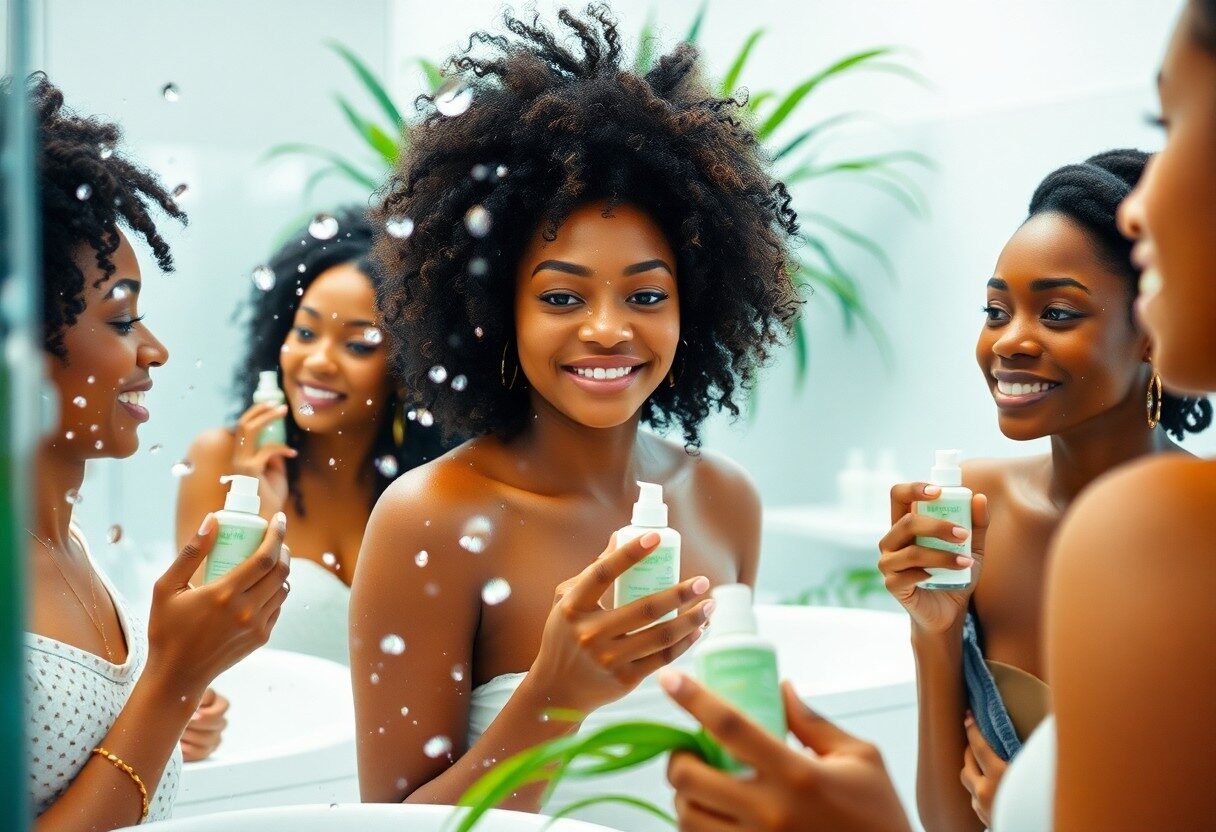
Top Hydrating Ingredients to Seek Out
Natural Moisturizers Vs. Synthetic Options
Natural moisturizers, derived from plant-based sources, often contain a wealth of vitamins and nutrients beneficial for skin health. Ingredients like shea butter, coconut oil, and aloe vera are common examples. In contrast, synthetic moisturizers, created in laboratories, can provide immediate hydration but may lack the deeper nourishing properties of their natural counterparts. You might find that some synthetic options include potent humectants like glycerin or hyaluronic acid, which can work wonders. Ultimately, you should choose based on your skin’s unique needs and sensitivities.
Must-Have Hydrating Agents for African American Skin
For African American skin, certain hydrating agents excel in delivering moisture and maintaining balance. Look for ingredients such as hyaluronic acid, which can hold up to 1,000 times its weight in water, offering a deep hydration boost. Also, consider ingredients like glycerin, which attracts moisture from the environment, and squalane, known for its lightweight, non-greasy hydration.
These must-have hydrating agents not only work to replenish moisture but also help combat typical concerns such as dryness and uneven skin tone. For instance, hyaluronic acid’s ability to deeply hydrate is especially beneficial for managing the dryness that can exacerbate hyperpigmentation. Squalane, derived from olives or sugarcane, mimics natural skin oils, making it an excellent choice for maintaining soft and supple skin. Incorporating these ingredients into your routine can significantly enhance your skin’s overall texture and appearance, ensuring it remains healthy and radiant.
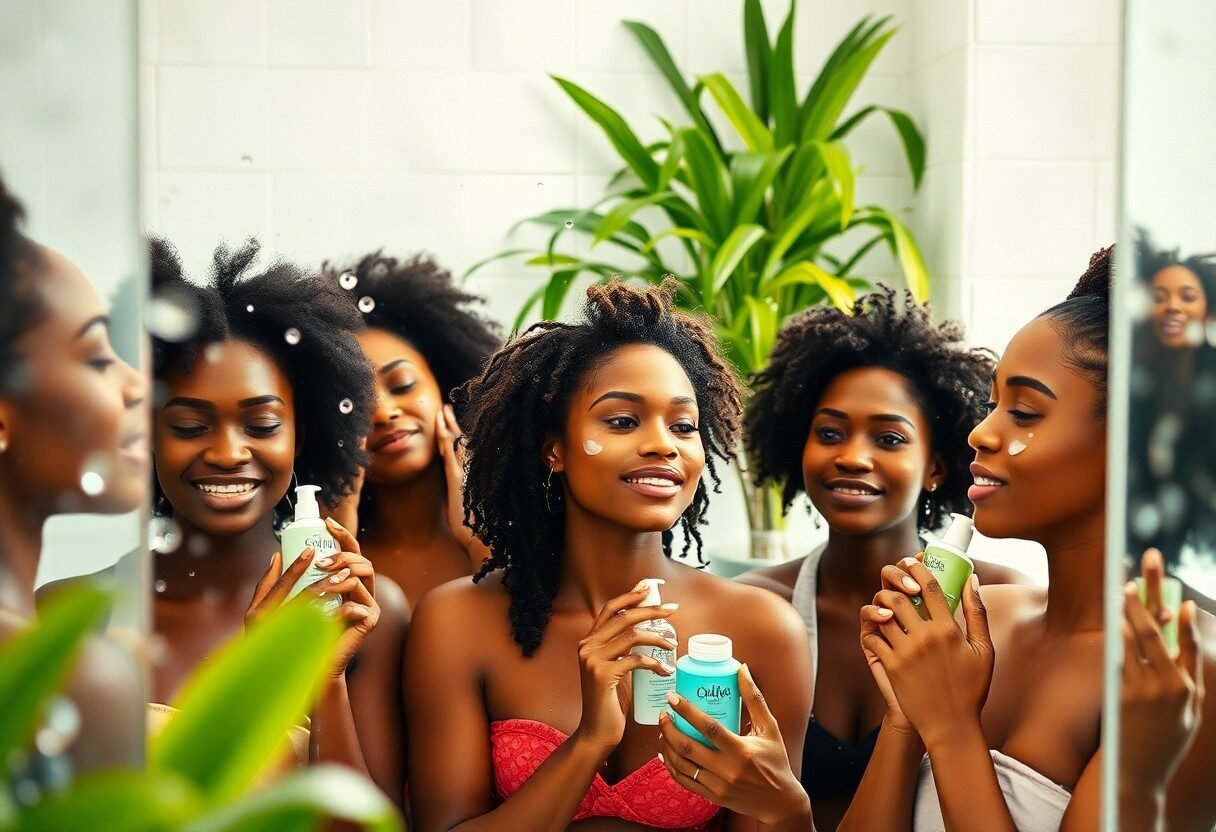
Practical Tips for Maintaining Optimal Hydration
For African American women, staying hydrated isn’t just about drinking water; it’s a holistic approach that encompasses various aspects of daily skincare and lifestyle choices. Below are some tips to help you maintain optimal hydration in your skincare routine:
- Drink at least 8-10 glasses of water daily to keep your skin hydrated.
- Incorporate hydrating serums containing hyaluronic acid into your routine for enhanced moisture retention.
- Use a humidifier in your home to combat dry air, particularly during winter months.
- Choose alcohol-free toners and creams to avoid stripping your skin of its natural oils.
- Exfoliate regularly to remove dead skin cells and allow your hydration products to penetrate better.
Daily Hydration Routines
Incorporating hydration into your daily routine can transform your skincare game. Start your morning with a glass of water and follow it up with a nourishing moisturizer. Throughout the day, keep a water bottle handy and opt for hydrating snacks such as fruits or vegetables. At night, applying a thick night cream can help fortify your skin’s moisture barrier for restoration as you sleep.
Seasonal Adjustments for Different Climates
Adjusting your hydration routine seasonally can have a profound impact on your skin’s health. During summer months, opting for lightweight, gel-based moisturizers can keep your skin feeling fresh without heaviness. Winter, on the other hand, calls for heavier creams and oils to combat dryness and prevent moisture loss.
For instance, during the chilling winter months, indoor heating can sap moisture from the atmosphere, leading to dry and flaky skin. Switching to a thicker cream or adding an oil to seal in moisture can be effective. In contrast, summer heat can lead to excessive sweating and dehydration. Using a hydrating mist throughout the day can help refresh your skin while maintaining hydration levels. Perceiving seasonal changes can empower you to tweak your skincare routine effectively, ensuring your skin remains radiant all year long.
The Importance of Internal Hydration
The Connection Between Water Intake and Skin Health
To maintain optimal skin health, sufficient water intake is vital. Studies show that drinking adequate amounts of water aids in skin elasticity, reduces dryness, and can even help diminish the appearance of fine lines. Your skin appears more plump and radiant when you are well-hydrated. With a direct link between hydration levels and skin health, your daily water consumption can profoundly influence how your skin looks and feels.
Foods that Promote Skin Hydration
Your diet plays a vital role in your skin’s hydration status. Incorporating specific hydrating foods into your meals can significantly improve your skin’s moisture levels. Foods such as cucumbers, tomatoes, and watermelon contain high amounts of water, while avocados provide healthy fats vital for maintaining your skin’s natural barrier. Snacking on nuts like walnuts, rich in omega-3 fatty acids, can also contribute to a hydrated complexion.
In addition to fruits and vegetables, consider adding foods like leafy greens, sweet potatoes, and berries to your diet. Leafy greens and sweet potatoes are packed with vitamins and minerals that support skin health, while berries provide anti-inflammatory benefits that can help soothe the skin. Staying hydrated from the inside out not only enhances your skin’s appearance but also promotes overall wellness, reflecting positively in your complexion. By consciously choosing hydrating foods alongside your water intake, you empower your skin to thrive.
Dispelling Common Myths About Moisturization
Misconceptions About Oily Skin and Hydration
Many believe that if their skin is oily, they don’t need to hydrate it. This is a misleading notion. Even oily skin can suffer from dehydration, resulting in a compromised skin barrier that can lead to irritation and acne flare-ups. By neglecting proper hydration, you may inadvertently trigger your skin to produce even more oil as it tries to compensate for the lack of moisture. Thus, using a lightweight, oil-free moisturizer is necessary for maintaining balance and ensuring your skin remains healthy and radiant.
The Fallacy of “Less is More” in Skincare
The phrase “less is more” doesn’t always apply in skincare. While minimalism can be effective for some, African American women often benefit from incorporating a variety of products tailored to their unique skin needs. A well-rounded routine that addresses hydration, exfoliation, and protection can enhance your skin’s overall appearance and health. Missing out on necessary steps, such as adequate moisturization or treatment products, can hinder your skin’s ability to thrive.
Skipping key products in your skincare routine under the guise of “less is more” may leave your skin vulnerable. For instance, using just a cleanser without a hydrating serum or moisturizer can strip necessary oils, leading to dryness or flakiness, especially for those with darker skin tones that are already prone to dryness. Your regimen should ultimately reflect your unique skin requirements, and incorporating a targeted approach—like layering a hydrating serum under your moisturizer—can make a noticeable difference in both hydration levels and overall skin health. Your skin deserves more than minimal care; it demands a thoughtful, comprehensive routine that addresses its specific needs.
To wrap up
Considering all points, I believe that hydration is an necessary component of an effective skincare routine, especially for African American women. You should prioritize drinking enough water daily and incorporating hydrating products into your regimen to maintain healthy, glowing skin. Your skin’s unique needs require attention, and by staying properly hydrated, you can enhance your complexion, reduce dryness, and promote overall skin health. So, take the steps necessary to ensure you are giving your skin the hydration it craves.
FAQ
Q: Why is hydration particularly important for African American women’s skin?
A: Hydration is crucial for all skin types, but for African American women, it can help address unique challenges such as dryness and uneven skin tone. Melanin-rich skin can sometimes appear dull when not adequately hydrated, making it vital to maintain moisture to promote a vibrant and radiant complexion.
Q: What are the best ways to keep my skin hydrated?
A: There are multiple ways to ensure your skin stays hydrated. Firstly, drink plenty of water throughout the day to hydrate from the inside out. Additionally, incorporate a good moisturizer suitable for your skin type and consider using hydrating serums that contain ingredients like hyaluronic acid, glycerin, or natural oils. Lastly, don’t forget to hydrate your skin from the outside as well, by applying lotions or creams immediately after showering or washing your face, as this locks in moisture.
Q: How does hydration affect the appearance of aging in the skin?
A: Well-hydrated skin tends to look plumper and more youthful. Proper hydration can help minimize the appearance of fine lines and wrinkles, which can be more pronounced when the skin is dry. Keeping the skin moisturized can also improve elasticity and firmness, reinforcing a youthful appearance as you age.
Q: Should I use different moisturizers for day and night?
A: Yes, using different moisturizers for day and night can be beneficial. Day moisturizers usually include SPF to protect against harmful UV rays and may have lighter textures to be more suitable for daily wear. Night creams often contain richer formulas that work to repair and hydrate the skin while you sleep, providing deep nourishment as your skin regenerates overnight.
Q: How do climate and environment affect my skin’s hydration levels?
A: Climate and environment play significant roles in skin hydration. In dry or windy conditions, skin can quickly lose moisture, leading to dehydration. Similarly, indoor heating or air conditioning can strip moisture from the air, affecting your skin. In contrast, humid environments may provide natural hydration to the skin. Adjust your skincare routine accordingly to counteract these effects, such as using a humidifier in dry environments or incorporating heavier moisturizers during colder seasons.
Q: Are there specific ingredients I should look for in skincare products for better hydration?
A: Yes, certain ingredients are particularly effective in promoting hydration for African American skin. Look for products containing hyaluronic acid, which draws moisture into the skin, as well as glycerin, which acts as a humectant. Natural oils like jojoba, argan, and shea butter can provide nourishing hydration and improve skin barrier function. Additionally, vitamins E and C can help to enhance moisture retention while providing antioxidant protection.
Q: How can I tell if my skin is dehydrated?
A: Signs of dehydration may include tightness, flakiness, or dullness in your complexion. You might also notice an increase in sensitivity or a rough texture. Pinching your skin gently can help test elasticity—dehydrated skin may not bounce back as quickly. If you suspect your skin is dehydrated, adding a consistent hydrating routine can improve these symptoms effectively.
